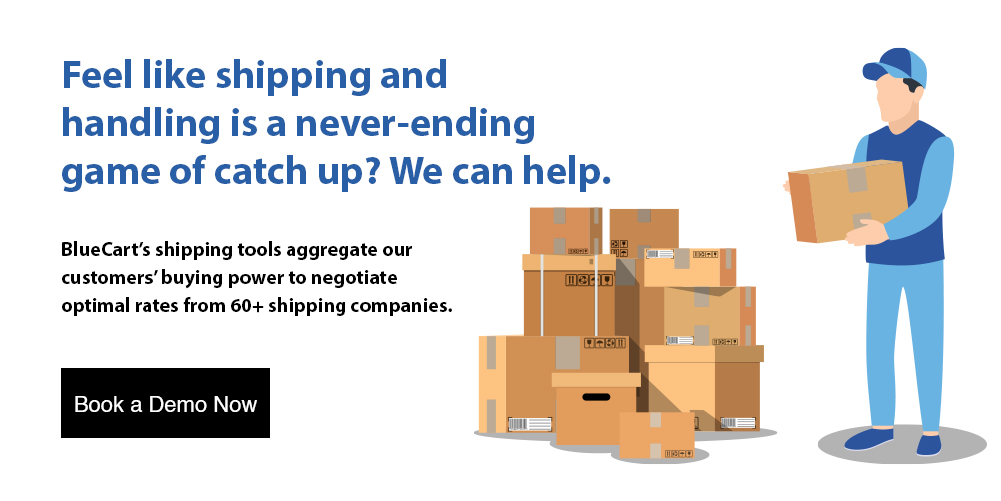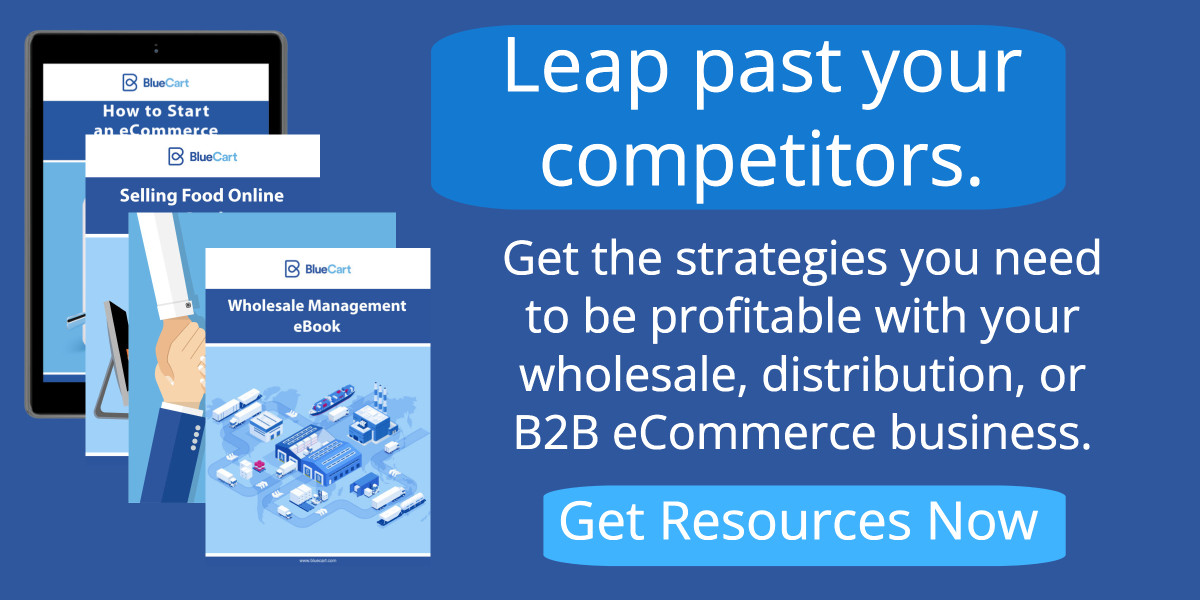Sustainable eCommerce involves taking a holistic approach to online b2b eCommerce. It considers the environmental and social impacts of every aspect of the business, from sourcing and production to shipping and handling wholesale distribution of high demand products.
Key Takeaway: By adopting sustainable practices, B2B eCommerce companies can reduce their impact on the environment and society. In addition, integrating sustainable eCommerce practices can help business owners build trust and loyalty with customers who value sustainability.
eCommerce has exploded in recent years, and with it, the amount of eCommerce packaging materials used to ship products and shipping costs by weight has also increased. This is a problem because much of this packaging are not recyclable and ends up in landfills, contributing to environmental waste.
However, there are steps that eCommerce businesses can take to minimize their environmental impact and adopt more sustainable packaging practices. This article explores the top ten sustainable ecommerce packaging options businesses can use.
Before we continue, let’s look at the basics of sustainable eCommerce for businesses.

What is Sustainable eCommerce?
Sustainable eCommerce refers to the practice of conducting online retail business in a way that is environmentally and socially responsible. With the increasing popularity of online shopping, it is important to consider the environmental and social impacts of eCommerce and strive to minimize negative impacts while maximizing positive ones.
Overall, sustainable eCommerce involves considering how to be sustainable in all eCommerce business process flow, from packaging and shipping to employee practices and charitable giving. eCommerce companies can improve their reputation and build stronger relationships with customers, employees, and suppliers
One key aspect of sustainable eCommerce is reducing the carbon footprint of online eCommerce. This can be done in a number of ways, such as by using renewable energy sources to power eCommerce websites and warehouse management systems, cutting down on the use of single-use plastics in packaging, and improving last-mile delivery logistics to cut down on emissions from transportation.
Top 7 Ways to Practice Sustainable eCommerce
There are several ways that eCommerce companies can practice sustainability:
- Reduce packaging waste: Packaging is a major source of waste in eCommerce, and companies can minimize this by using eco-friendly packaging materials and designing packaging that is easy to recycle.
- Choose eco-friendly shipping options: eCommerce companies can also reduce their environmental impact by choosing carriers that use low-emission vehicles and offer carbon-neutral shipping options.
- Support eco-friendly suppliers: Companies can support sustainable practices by partnering with suppliers that prioritize environmental and social responsibility in their operations.
- Promote energy efficiency: eCommerce companies can reduce their energy consumption by using energy-efficient servers and other equipment, and by implementing energy-saving measures in their facilities.
- Encourage responsible consumption: eCommerce companies can promote sustainability by educating customers about the environmental and social impacts of their purchasing decisions and encouraging them to make responsible choices.
- Practice ethical labor practices: eCommerce companies can also support sustainability by ensuring that their employees are treated fairly and ethically, and by working with suppliers that prioritize ethical labor practices.
- Support charitable causes: Many eCommerce companies support charitable causes as part of their sustainability efforts, such as donating a portion of their profits to environmental or social causes.
Another important aspect of sustainable eCommerce is strategic sourcing.
Ethical sourcing involves ensuring that the products sold online are produced in a way that respects the rights and well-being of the workers involved in their production, as well as the environment. It can include using fair trade practices, supporting sustainable and responsible farming and production methods, and avoiding products made with child labor or forced labor.
Want to know how AI in eCommerce can help you create a more efficient sales and marketing process? Read this blog!
In addition to these practices, sustainable eCommerce involves promoting sustainability to customers and encouraging them to make environmentally and socially responsible choices. This can be achieved through transparent communication about the sourcing and production of products, offering eco-friendly alternatives and providing information about the environmental and social impact of different products.
Sustainable eCommerce considers the lifecycle of products, from raw materials to disposal. This can include designing products for reuse, repair, and recycling, as well as offering buyback or trade-in programs to extend the life of products and reduce waste.

Top 10 Sustainable eCommerce Packaging Options
Sustainable ecommerce packaging is becoming an increasingly important issue as online shopping continues to grow in popularity. The convenience of shopping from the comfort of homes has led to an increase in the amount of packaging materials used to ship products.
One of the main challenges with ecommerce packaging is that it needs to be strong enough to protect the product during shipping, while also being lightweight to keep shipping costs low. However, it's important for businesses to find a balance and consider the environmental impact of their packaging choices.
There are several sustainable options available for ecommerce businesses looking to reduce their environmental footprint. Here are top ten options you can try out:
- Recyclable Cardboard Boxes
One of the most popular options for ecommerce packaging is cardboard boxes. Look for boxes made from recycled materials and be sure to recycle them after use. These boxes are strong enough to protect products during shipping and can be easily recycled after use.
- Reusable Boxes
Another option is to use reusable boxes, which can be shipped back and forth between the wholesaler and the customer, reducing the need for disposable packaging. This reduces the amount of waste generated.
- Kraft Paper
Kraft paper is a natural, biodegradable alternative to plastic bubble wrap and packing peanuts. It is also easily recyclable.
- Biodegradable Bubble Wrap
For products that need extra protection during shipping, consider using biodegradable bubble wrap. It breaks down more quickly than traditional plastic bubble wrap and is a more sustainable option.
- Recyclable Mailers
Poly mailers are a popular choice for shipping smaller items, but they are not always recyclable. Look for mailers made from recycled materials or biodegradable options.
- Cornstarch Packing Peanuts
Instead of traditional plastic packing peanuts, opt for biodegradable cornstarch peanuts. They are easily compostable and a more sustainable alternative.
- Biodegradable Packing Tape
Traditional packing tape is made from plastic, which is not biodegradable. Instead, look for biodegradable packing tape made from natural materials.
- Reusable Shipping Envelopes
Similar to reusable boxes, reusable shipping envelopes can be used multiple times, reducing the need for disposable packaging.
- Recyclable Poly Bags
Poly bags are often used to protect items during shipping, but they are not always recyclable. Look for poly bags made from recycled materials or biodegradable alternatives.
- Soy-based Ink
Traditional ink is made from petroleum, which is not environmentally friendly. Soy-based ink is a more sustainable option that can be used on packaging and shipping labels.
Shipping frozen food can be a nightmare if you don't know where to start. Learn how to ship frozen food the right way in this blog.
Top 5 Benefits of Sustainable eCommerce
By adopting sustainable practices, businesses can not only reduce their environmental impact, but also improve their financial performance and reputation in the marketplace.
There are several benefits of sustainable ecommerce for businesses, including:
- Increased customer loyalty: Sustainability is becoming increasingly important to consumers, and businesses that prioritize sustainability are more likely to attract and retain customers who value these efforts.
- Cost savings: Implementing sustainable practices can lead to cost savings in a number of ways. For example, reducing energy and water usage can lower utility bills, while using eco-friendly packaging can reduce waste disposal costs.
- Improved brand reputation: Businesses that prioritize sustainability often enjoy a positive reputation in the marketplace, which can lead to increased brand awareness and customer loyalty.
- Increased competitiveness: As sustainability becomes increasingly important to consumers, businesses that prioritize sustainability may have a competitive advantage over those that do not.
- Legal and regulatory compliance: Some countries and regions have laws and regulations related to sustainability, and businesses that fail to comply with these requirements may face fines or other penalties. Adopting sustainable practices can help businesses stay compliant and avoid these risks.
.jpg)
Frequently Asked Questions About Sustainable eCommerce
Here are some frequently asked questions about sustainable eCommerce.
What is Sustainable eCommerce?
Sustainable ecommerce refers to the use of eco-friendly practices in the online eCommerce industry. This includes things like reducing energy and water usage, using eco-friendly packaging, and minimizing waste.
Why is Sustainable eCommerce Important?
Sustainable ecommerce is important because it helps reduce the environmental impact of online eCommerce, which is a growing industry. It also helps businesses save money and improve their reputation with consumers who value sustainability.
How can Businesses Make Their eCommerce Operations More Sustainable?
There are several ways that businesses can make their ecommerce operations more sustainable, including reducing energy and water usage, using eco-friendly packaging, and minimizing waste. Additionally, businesses can consider using renewable energy sources and working with suppliers who prioritize sustainability.
What are Some Examples of Sustainable eCommerce Practices?
Examples of sustainable ecommerce practices include:
- Using eco-friendly packaging
- Reducing energy and water usage
- Minimizing waste
- Using renewable energy sources
- Working with suppliers who prioritize sustainability
- Implementing programs to offset carbon emissions
What are the Benefits of Sustainable eCommerce for Businesses?
The benefits of sustainable ecommerce for businesses include:
- Increased customer loyalty
- Cost savings
- Improved brand reputation
- Increased competitiveness
- Legal and regulatory compliance
Achieving Sustainability
By implementing these sustainable ecommerce packaging options, businesses can reduce their environmental impact and help protect the planet. It's a win-win for both the business and the environment.
In conclusion, sustainable ecommerce packaging is essential for reducing the environmental impact of online shopping. By making conscious choices about the materials used in packaging, businesses can minimize their impact and contribute to a more sustainable future.